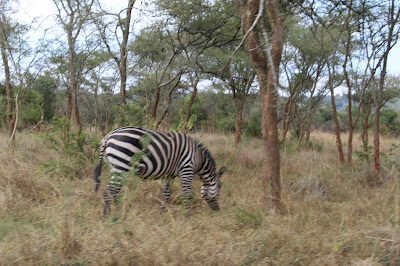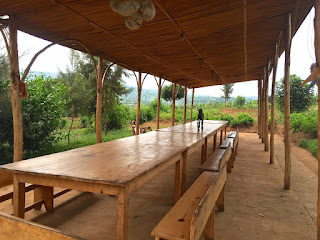As we were staying and working in
Musanze all this week, observing health and agriculture trainings and attending
home visits with GHI mamas, we were able to take advantage of the area for our
weekend activities. We received some advice from fellow GHI staff members on
what to do, and planned our weekend accordingly. Our first adventure was our
hike of Mt. Kabuye, which was about 40 minutes from where we were staying. The
Musanze district includes Volcanoes National Park, where besides from hosting
gorilla and golden monkey trekking, facilitates hikes up the 5 beautiful
volcanoes within it. However, each of those hikes are pretty pricey, so we
settled for Kabuye, which is an unofficial hike (it doesn’t have an established
trail), but it is extremely beautiful, and more importantly for us, free! Mt.
Kabuye is the tallest non-volcanic peak in Rwanda, yet many Rwandans live along
it at its high elevation, and travel up and down the mountain daily. We were
excited to take on the challenge.
First we
took a bus from Musanze to Gakenke, but we got off a stop too early and had a little difficulty communicating with moto drivers where we were trying to go. Eventually, we hopped on
the motos, hoping for the best, and ended up traveling for a while along this
extremely steep, bumpy road until the motos could drive no further. Here we met
a snazzy young man named Jean Paul, wearing a bright red sweat suit, a red
beanie, and red flip flops (pretty inappropriate for the beating sun and the
difficult uphill climb we were about to embark on, but as stated, he was a
snazzy guy), who was very eager to lead us up the mountain. We didn’t actually
know where we were going, and others had recommended trying to get a guide, so
we agreed. Jean Paul spoke a decent amount of English, would play Justin Bieber’s
“Sorry” out loud from his phone every so often, and even in his flip flops
compared to our hiking boots, was speedy quick. We were sweating within
minutes. All the way up, the view was absolutely spectacular, although we
couldn’t quite capture it on camera because the sun was so bright that the
distant hills appeared hazy. After about an hour and 45 minutes of steep uphill
ascent, we arrived at the top, 8,8000 feet up. We stayed up here for a while
taking in the beautiful scene and regaining energy, and then reluctantly began
our descent, which was just as hard as going up because it was steep and
slippery. Finally, we made it back to the Gakenke town, caught a bus back to
Musanze, and celebrated our first true Rwandan travel adventure with a big
meal.
 |
| Ryan and Caitlin at the top of Mt. Kabuye!!! |
Our second
highlight of the weekend was visiting the campground Red Rocks. Ryan had seen
this place online, but Danielle, one of the GHI fellows, had recommended we go
visit the campground because her friend ran it. We took motos to the
campground, which was not too far from where we were staying, not really
knowing what to expect. Harriet, Danielle’s friend, welcomed us with open arms
and told us all about Red Rocks, which was beautiful and extremely cool. The
goal of Red Rocks is to provide a way for tourists to genuinely interact with
the cultural Rwandan community. Harriet recruited the surrounding community’s
most vulnerable women to run the camp, and she works with them to run their own
cooperative of farming and activities that they can do along with tourists in
order to make money for themselves. Some of these activities include basket
weaving, making banana beer, organic farming, beekeeping, and more. Harriet
does not provide handouts for these women, but merely facilitates their
business activities through Red Rocks and shows them that they possess the
ability to better their lives. We talked with Harriet for hours and she gave us
a tour of the entire campground, which is amazing. We really want to go back
and stay there, and we recommend anyone who is planning to visit Rwanda to do
the same. Regardless, however, everyone should check out Red Rocks and the work
that Harriet is doing, because she is genuinely awesome.
http://www.redrocksrwanda.com/
Our final,
and greatest, highlight of the weekend was gorilla trekking. Gorilla trekking
is a staple of Rwandan tourism, as Volcanoes National Park holds over 800
gorillas, 2/3 of the world’s population. There are 20 different gorilla
families—10 are used for tourism and 10 are used for research purposes—that
range in size from 12 to 33 members. In order to go trekking, you have to
secure a very pricey permit several weeks in advance, as they only allow 80
individuals to go each day (up to 8 people in each group trekking each of the
gorilla families). On Sunday morning, we woke up early and were driven to the
RDB (Rwanda Development Board) Headquarters in Volcanoes National Park, where
we were split up into our trekking groups. We chose a “medium” trek, which
indicates the difficulty and time spent trekking to find the gorilla family,
and were assigned to the gorilla family called Umubano, which means “friendly”
in Kinyarwanda. Our guide, Loyce, told us about the family, which consists of
14 members who live within the jungle around the volcano Mt. Bisoke. After this
briefing, we were driven to our starting location to begin our trek. Our group
was very diverse and interesting. Besides from the two of us, it consisted of a
Korean UN Peacekeeper stationed in the Democratic Republic of the Congo along
with his two friends, an HR consultant from Canada and her Rwandan tour guide,
and a Japanese woman who was currently living in Rwanda.
We all followed our guide, a
gorilla tracker, and a separate porter who held a machete and cleared a path
for us as we trekked through the jungle. It was hard work: a very steep
incline, a lot of ducking and climbing over things that obstructed our way, and
lot of pricks by thorns and nettles, but it was all completely worth it. After
about an hour and 45 minutes of trekking, we arrived at the gorilla family. We saw
the dominant male first, the silverback, who was extremely striking, before
seeing two women gorillas and a baby. The mom and child would play, hug, and
groom one another, and we couldn’t stop watching. We were so surprised by how
human-like they were, which makes sense as we share 98.5% of our genes. We had
both seen gorillas before in the zoo, but seeing them in their natural habitat
and being close enough that we could touch them was an absolutely incredible
experience that we will never be able to forget. They are such friendly and
magnificent creatures. We saw about 3 more gorilla family members as we moved
around the area, but before we knew it our hour was up.
Our trek back down the volcano was
much easier than the incline because we were moving along an established trail,
and before we knew it we were back at our starting point. We headed back to
Musanze where we collected our stuff, had lunch, and then finally boarded a bus
back to Kigali. On the two hour, beautiful bus ride, we were able to reflect on our awesome weekend of adventures and prepare for our upcoming week of work back at the farm. We are excited for
what’s ahead!
 |
| Gorillas are pretty cool |




















